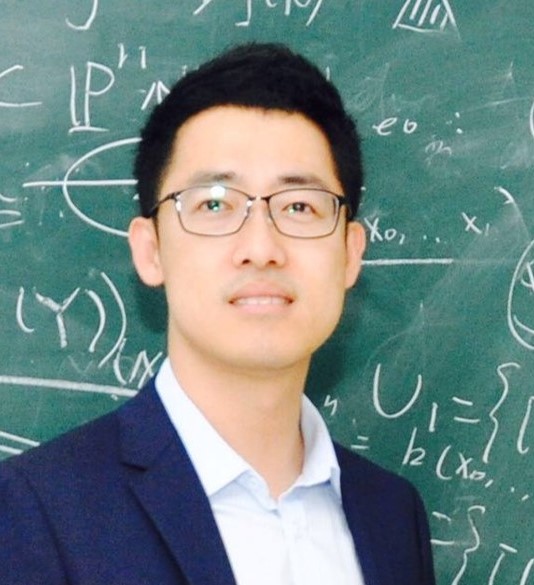Speakers

Jianfeng Feng,Ph.D, chair professor of Shanghai National Centre for Mathematic Sciences, and the Dean of Institute of Science and Technology for Brain-Inspired Intellignece in Fudan University. He has been developing new mathematical, statistical and computational theories and methods to meet the challenges raised in neuroscience and mental health researches. His research interests are mainly in big data analysis and mining for neuroscience and brain diseases. He was awarded the Royal Society Wolfson Research Merit Award in 2011, as a scientist having ‘great achievements or potentials’. He has made considerable contributions on modelling single neurons and neuronal networks, machine learning, and causality analysis with publications on JAMA Psychiatry, Molecular Psychiatry, Brain, PNAS, PRL, J Neuroscience etc. He has proposed and developed BWAS method (Brain-wide association study), and successfully applied it to search the roots in depression, schizophrenia and autism. He also developed functional entropy method and applied it to the study of ageing, intelligence and creativity, etc.

Qiyong Gong M.D., Ph.D., professor of Clinical Radiology, the vice president of West China Hospital in Sichuan University. He is Changjiang Distinguished Professor, and recipient of the Distinguished Young Scholars award from the National Natural Science Foundation of China. He is currently and director of the Huaxi Magnetic Resonance Research Center (HMRRC). Dr Gong serves on the academic committee of the International Society of Magnetic Resonance Medicine (ISMRM). His research into magnetic resonance imaging of neuropsychiatric disorders has received international recognition. He won the National Natural Science Award in 2015, was elected a member of the International Society of Medical Magnetic Resonance (ISMRM Fellow) in May 2016, and the First Annual Gold Award of the Chinese Radiological Society in October 2016, the Outstanding Contribution Award.

Yong He, Ph.D, Professor of Beijing Normal University, Changjiang Distinguished Professor, Distinguished Young Scholars of The National Science Foundation of China. In 2005, he received a doctorate from Institute of Automation, Chinese Academy of Sciences, and postdoctoral from Montreal Institute of Neurology, McGill University, Canada, 2005-2007. He is the deputy director of the State Key Laboratory of Cognitive Neuroscience and Learning, the first director of the Beijing Key Laboratory of Neuroimaging Big Data and Brain Connection Histology, the head of the research group of IDG/McGovern Institute of Brain Sciences, and the first chairman of the Psychological Brain Imaging Committee of the Chinese Psychological Society. He is the associate editor of Human Brain Mapping, and is on editorial board of NeuroImage.

Weihua Yue, M.D., Doctor of Medicine. She is currently the deputy director of the Sixth Hospital of Peking University (Institute of Mental Health), and the deputy director of the National Center for Clinical Psychiatry Research. She is Distinguished Young Scholars of The National Science Foundation of China, and is Beijing Science and Technology Star. She has been engaged in clinical and basic research related to mental illness and studied at Harvard University as a visiting scholar. She has undertaken the national key R&D plan, National 863 plan and other projects. Her research focus on the mechanism, diagnosis and treatment of schizophrenia and other common mental disorders from the aspects of clinical cohort, molecular genetics and neurobiology.

Professor Keith Kendrick has a BA (1976) and PhD (1979) in Psychology from the University of Durham in the UK. He has held research positions in the University of Durham, Institute of Zoology, University of Cambridge and at the Babraham Institute in the UK prior to moving his current post in the School of Life Science and Technology at the University of Electronic Science and Technology of China (UESTC) in Chengdu in 2011 as a National 1000 Talent Professor. He has published over 280 peer-reviewed papers, including many in Nature, Science and PNAS as well as in leading Psychiatric journals. The total citation for his publications is now over 14,800, with 40 papers’ citations over 100 and 5 papers over 300 and the H index is 72. He is entitled as “Elsevier China Highly Cited Scholars” and has received numerous competitive research grants from both UK and China-based funding agencies.

Jijun Wang, MD, psychiatrist at Shanghai Mental Health Center, the director of EEG-MRI center, director of neurophysiology and neuroimaging in Department of Psychiatry, Shanghai Jiaotang University. He is the young member of EEG and Neuroelectrophysiology Committee of Shanghai Medical Association. He graduated from the Medical Department of Peking University Medical College in 1989. His main research fields are transcranial magnetic stimulation therapy technology, pathophysiological mechanism of schizophrenia, sleep disorders and depression, and new intervention targets. He has been awarded the Science and Technology Progress Award of the Ministry of Health, and the Science and Technology Progress Award of Shanghai. He has published more than 80 papers on JAMA Psychiatry, American journal of Psychiatry, ect.

Chao-Gan YAN, Ph.D,professor at the Institute of Psychology, Chinese Academy of Sciences (IPCAS). He is the Deputy Director of the Magnetic Resonance Imaging Research Center and the Principal Investigator of The R-fMRI Lab located at IPCAS. Before he joined the IPCAS through the Hundred Talents Program of CAS in 2015, he worked as a Research Scientist at the Nathan Kline Institute for Psychiatric Research and a Research Assistant Professor at the Department of Child and Adolescent Psychiatry, New York University School of Medicine. Dr. Yan received his Ph.D. degree in Cognitive Neuroscience from State Key Laboratory of Cognitive Neuroscience and Learning at Beijing Normal University in 2011. His research mainly focuses on the resting-state fMRI (R-fMRI) computational methodology, mechanisms of spontaneous brain activity, and their applications in depression. He has addressed fundamental methodological issues (e.g., impact of head motion (ESI Top 1‰ of highly cited papers), standardization (ESI Top 1% of highly cited papers) and multiple comparison correction (ESI Top 1% of highly cited papers)) on the study of resting-state functional connectomics. He has also developed data processing and analysis toolbox for R-fMRI, DPABI (ESI Top 1‰ of highly cited papers) and DPARSF, with the latter has been cited over 1700 times. He initiated a Chinese consortium for big data of brain imaging of depression (REST-meta-MDD), performed big data study of depression neuroimaging, and studied the brain mechanisms of depression through a longitudinal study of animal model. He has published 50 peer-reviewed articles (20 as first or corresponding author) in prestigious journals including PNAS, Cerebral Cortex, NeuroImage, Human Brain Mapping, Neuroinformatics, Translational Psychiatry. His work has been widely cited in the scientific community (total citations > 9000, http://scholar.google.com/citations?user=lJQ9B58AAAAJ), achieving an h-index of 27. Additionally, he currently serves in the editorial boards of NeuroImage and Journal of Neuroscience Methods, and a member for the OHBM Communications Committee.

Dr. Jie Zhang received Ph.D. degree from Hong Kong Polytechnic University in 2008, and is currently a Professor with the Institute of Science and Technology for Brain-inspired Intelligence (ISTBI) in Fudan University. He has won the "Hong Kong Young Scientists Award" nomination award, and is an honorary member of "System Modeling Analysis and Prediction" laboratory of the University of Oxford. His research interests include brain network, human intelligence and mental disorders. He has published more than 60 SCI papers in journals including PNAS, PRL, Brain, and Cerebral Cortex. One of his paper published in Brain 2006 on dynamic brain networks was selected as a cover paper, and Professor Dani Bassett, the 2014 MacArthur Prize winner wrote a commentary for this paper in Brain.
Registration